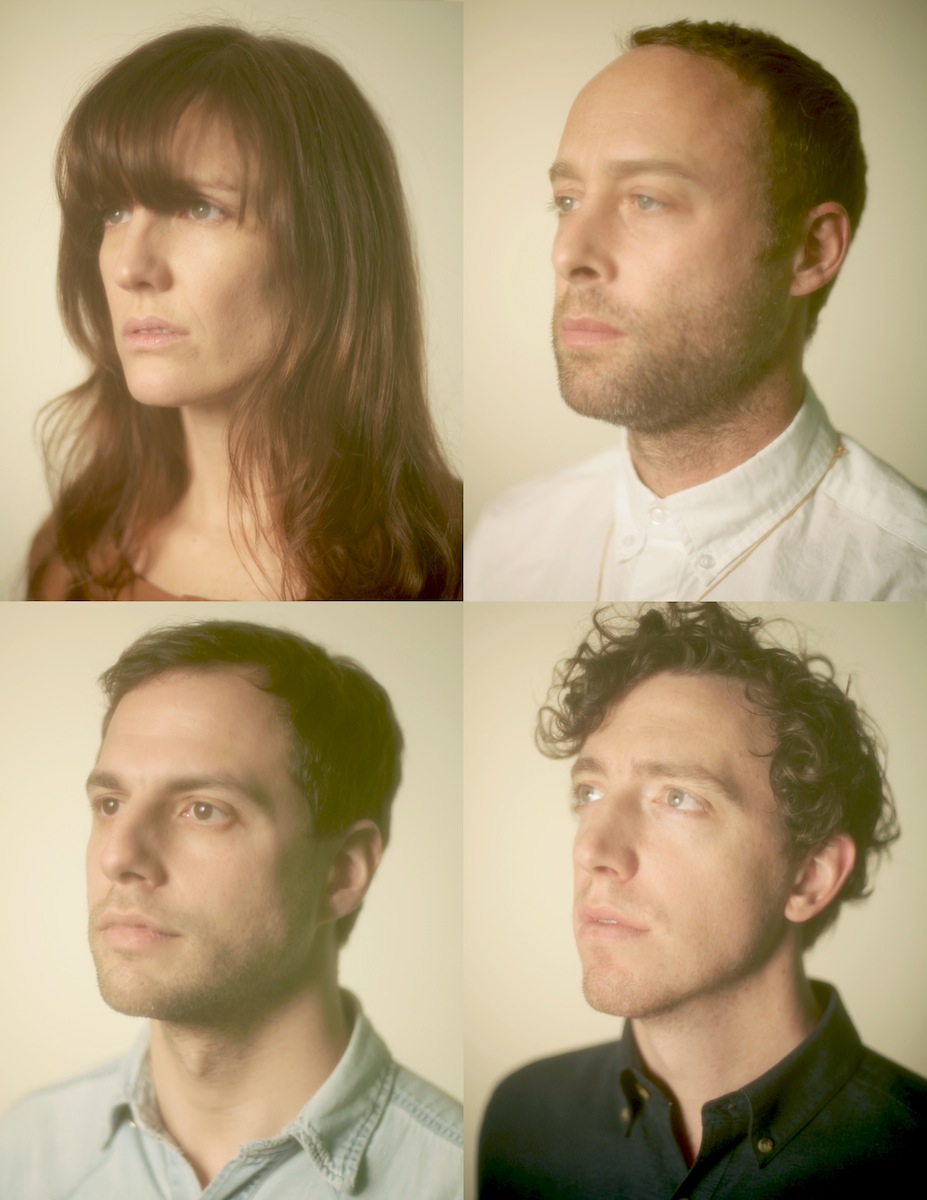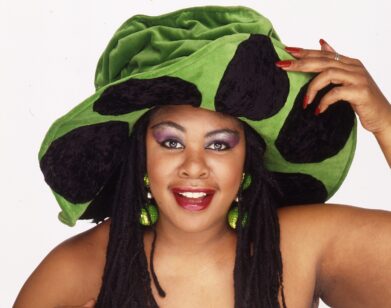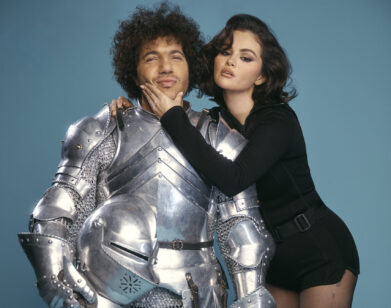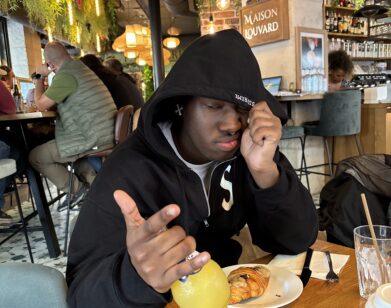Here We Go Magic’s Production Values

ABOVE: HERE WE GO MAGIC. IMAGE COURTESY OF GREG MITNICK
Here We Go Magic frontman Luke Temple believes strongly in that moment when the recorder turns on and the creativity flows out. The project’s first album was a concept before it was a band: Temple wrote and produced the 2009 eponymous debut alone. But in order to tour and realize his vision, a band came together: Kristina Lieberson (keyboards), Michael Bloch (guitar), Jennifer Turner (bass guitar), and Peter Hale (drums).
For their latest album, A Different Ship, Here We Go Magic paired with the notable Radiohead producer Nigel Godrich. The band is currently on tour in the UK and will return to the US for the summer festival season. We caught up with Temple shortly after arriving in London and spoke about Godrich’s influence, Temple’s songwriting process, and musical inspiration.
JARED LEVY: You have a lot of UK dates coming up. Do you feel like you have a big following there? How did that come to be?
LUKE TEMPLE: We have a British manager, so I think he understands the market over here better than the States. Also, it seems that, for this record, they’re getting it better over here—a more natural response to it. I don’t know if it’s just because it has been put in more hands over here or what. It also seems like journalism over here, in general, is at a higher level: not overrun by all these teeny little blogs. There’s more of a historical context for it or something. It seems like people review something or take a listen to something and they really do their homework. That’s just what it seems like.
I think there’s too much subtlety involved with this record and us as a band for it not to be taken seriously and listened to. If it’s just grazed over amongst many other releases coming out this month, it’ll go in one ear and out the other. It’s a little bit of a slow burn, so it needs more attention.
LEVY: Is there cachet for Nigel [Godrich] being involved as producer over in the UK?
TEMPLE: Yeah, that’s a good calling card to get people to come to the door, for sure. I don’t know if it’s more over here than in the states, since his cachet is equal all over the place. Radiohead are a universally loved band, and he’s sort of come along on the ride with them. He’s one of the only producers in the rock world that have that kind of fame attached to him: him and Rick Rubin or something. So, we were really lucky to work with him. The best part of working with him is that he’s so good at what he does. He made our record sound so great. And, any cachet he brings with it is good luck for us.
LEVY: Do you think this is a one-off, or do you think you’ll keep working with him?
TEMPLE: Fingers crossed, you know? We’re friends and he’s a big fan of us, so who knows? He definitely set the bar pretty high.
LEVY: What do you feel that he brought to the process?
TEMPLE: If you produce yourself and you’re working in a band, there’s certain compromises everyone has to make, because it’s a democracy and you have to cater to each other’s feelings. When you have a producer, you have this objective ear that’s not worrying about protecting anybody’s feelings, so he’s just making hard decisions based on what works and what doesn’t, which was huge for us. I don’t think we’d be able to make those decisions by ourselves. Also, his sense of economy with sound is really huge. We have a tendency to add more and more until it has a satisfying build. His way of building things is by stripping away, which I hadn’t thought of before. It seems like it makes total sense, but economy was huge.
LEVY: Do you feel like that was artistically significant for yourself and the band?
TEMPLE: Yeah, because what we were left with, for the most part, was just what we played—what we play as a band. This record is more true to who we are as a live band than any other record we’ve done. It allows for the listener to hear our own individual idiosyncratic voices.
LEVY: After Pigeons, did you intend to progress your sound? Did you intend to make something different? What was your artistic goal coming to this record?
TEMPLE: I wanted, basically, to record us live or try to record only what we could produce with our hands and mouths. I wanted the songs to be simple. I wanted to get the most from what we could do in real time. So, working with Nigel was really fortuitous, because that’s kind of how he works anyways. It was a perfect marriage between what I was thinking about and what ended up happening working with him.
LEVY: The lyrics on the new album have motifs of loneliness and transience. Some songwriters shun being called “personal songwriters,” but is that a title you embrace? Or, do you think that it’s not as intentional as writing from personal experience?
TEMPLE: I don’t think about that stuff so much. For one, the nonverbal aspects of music are the most important to me. Then, whatever sort of emotion the music carries, intrinsically, dictates the images that unfold, lyrically. Topical writers usually have the topic before they begin writing the song, but, for me, it’s the other way around. I do love the marriage of words and music. I do love them in terms of little snapshots. But, I guess I understand my own internal world, so there’s a well to dip into for me that’s easier than getting an idea from reading the newspaper. For me, it just seems to work. I have a pretty easy time free-associating random images and words together and then creating some loose narrative quickly: I write lyrics really fast. When it’s time to write, I usually put them off until the very end and then when it’s time to write I can just sit down: I sing the melody, whatever the melody is, because that’s the first thing that’s already been there for a long time; I start singing it and I start creating consonants and vowels; then they turn into words; then all of the sudden one sentence will happen; then that sentence will dictate how the rest of the sentences happen. Past that, I don’t have to think too hard to keep it within a certain narrative thread. That happens because certain words trigger other associations you have in your mind. So, there is this inherent narrative in the end, whether it is abstract or what.
LEVY: With “Over The Ocean,” I think that song is really successful, because it captures that feeling, literally…
TEMPLE: That one, actually—the first line, “Over the ocean”—was a result of a random dramatic image of looking at the ocean from the sweeping melody: like the plane trip we just had and looking at the ocean from a plane. It went off from there. That, actually, became very literal. That is about looking at the ocean from a plane, but it’s weird how they offer themselves up. It wasn’t a subject matter that I really was interested in talking about before. It just kind of came out of my mouth.
LEVY: That’s a neat kind of alchemy. Were you listening to anything in particular when you were making this album? Do you feel that any influences bled through?
TEMPLE: When I’m in writing mode I tend not to listen to music. I usually have a gestation period before I start writing. When I’m listening, it usually happens on the road. So, we’d been listening to a lot of music on tour the year before and all that stuff sank in. “Over The Ocean” was influenced by us watching this Kraftwerk documentary the night before that song was written. I was thinking about how Kraftwek’s melodies tend to be simple major chord progressions and I was thinking how it’d be cool to write a song with that kind of theme, so that song kind of came out. For “Hard To Be Close,” I think I had listened to Love Is Overtaking by Arthur Russell. There are just random different little associations here and there: something that inspires you.
HERE WE GO MAGIC’S NEW ALBUM A DIFFERENT SHIP IS OUT TODAY. FOR MORE ON THE BAND, VISIT THEIR WEBSITE.






